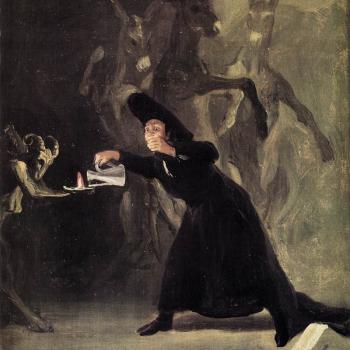There is something very tempting, even true, here. I am (an increasingly-reticent) contrarian; I am known (to myself anyway) for my melancholic outlook. But I am not prepared to endorse Griffiths’ position fully (even if I admire much of his academic work); full-throated praise must give way to a question or two. What of joy? What of gratitude?
Augustine seems to lie in the background of what Griffiths writes. True, the great saint railed against the idea that the Stoic goal of apathy could be accomplished in this life. It is foolish to presume that we can totally remove ourselves from worldly affairs. We must eat. We must drink. We must have preferences (as much as I might love Meister Eckhart, I must admit these things). We may cultivate virtues and excel in dispassion—these are fine. But there can be no abstraction from life itself, from the business of—as Griffiths would have it—work and worship. The monks sews and gardens; the hermit turns the pages of his breviary, prefers one book cover to another.
Augustine also reminds us that the love of worldly things must be directed at God; we love what we love because it helps us grow in love of Him. Implicitly, of course, this acknowledges that we will—that we must—love things. There’s no getting around it.
This sounds like it supports Griffiths’ point. But I wonder if it’s really so. We may not love this breviary or that pen intrinsically, but, if it reveals something of the Lord to us (and as a creation of God), we call it good; we recognize that God is revealed in His creation. Life is not all dour labor and sabbath glimpses of promised (but always distant) peace. There is some joy at work here, a sense that it is better to be than not to be (and God help me, I’m going to make this joke—that is the question). If life were just a curse, just the fall, then we probably wouldn’t want to hold on to it. Griffiths admits as much, but says that, fundamentally, it’s work and worship; we might see some good here and there, but, overall, it’s clear enough—pain reigns.
The thing is that I don’t even fully disagree. I just don’t think one (immense curse v. intrinsic goodness) is necessarily and essentially the correct one to emphasize. We human beings have spent a long time awaiting the New Jerusalem (and before that awaiting—if only in dim awareness—Christ). We are many people existing in many ages, spread across many continents, biomes, and topographies (okay, you get the idea). There will be times in which it makes sense to emphasize the curse, to emphasize the pain of a world filled with sorrow—hellish and uncompromising, with only limited and interrupted glances at tranquility. There will be times when the sadness and sorrow of life are such that the beauty of God’s creation must be emphasized, when even the pixels on a television screen or laptop can be God’s medium for working joy and thanksgiving into our cold, hard hearts. Qoheleth would seem to agree:
There is an appointed time for everything,
and a time for every affair under the heavens.
A time to give birth, and a time to die;
a time to plant, and a time to uproot the plant.
A time to kill, and a time to heal;
a time to tear down, and a time to build.
A time to weep, and a time to laugh;
a time to mourn, and a time to dance.
A time to scatter stones, and a time to gather them;
a time to embrace, and a time to be far from embraces.
A time to seek, and a time to lose;
a time to keep, and a time to cast away.
A time to rend, and a time to sew;
a time to be silent, and a time to speak.
A time to love, and a time to hate;
a time of war, and a time of peace.
(Ecclesiastes 3:1-8)
It’s not, of course, that I think Griffiths disputes any of this (and I am, given my temperament, more likely to agree with him on fetishizing leisure than many). But his prose betrays a certain one-sidedness. Does he speak this way because he thinks we live in an age of too much leisure, of the fetishization of leisure? Perhaps. I might even be inclined to agree with such an accusation. But one must remember that that might land one in the same world as the anti-video game apostolates, as the “be a man and square dance” sort of Christianity. We run the risk of over-reacting to our (entirely real and disordered) pursuit of permanent leisure and becoming either nostalgic or anti-enjoyment (of God through creation) in the process.
Christian life, if I may be platitudinous, involves finding joy and detachment in and through one another. We seek to follow God, He Who is permanent and unchanging, through a world of changes. But we are imperfect. We will be changed. The difficulty is in knowing when to emphasize which dimension of our ever-complex world. That is up to prudence, something that itself might find time for—if not otiun—at least rest.













